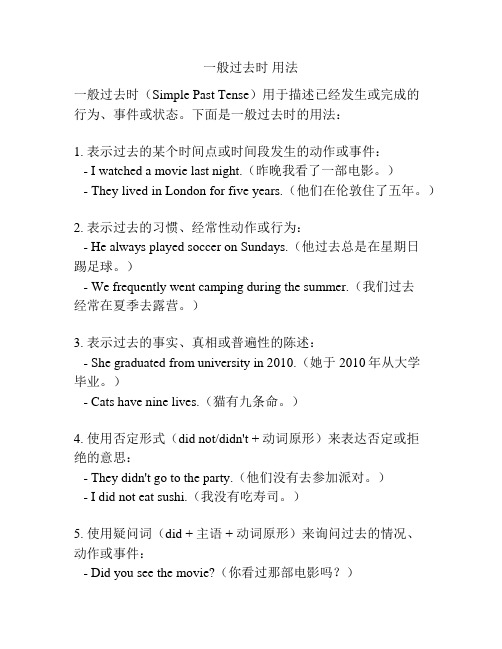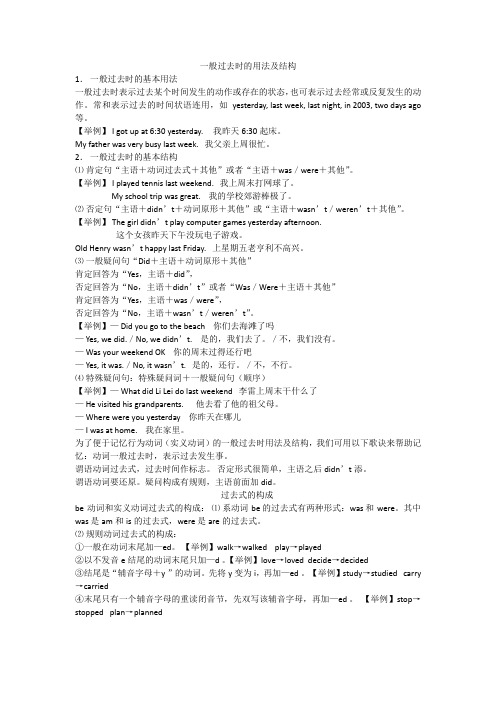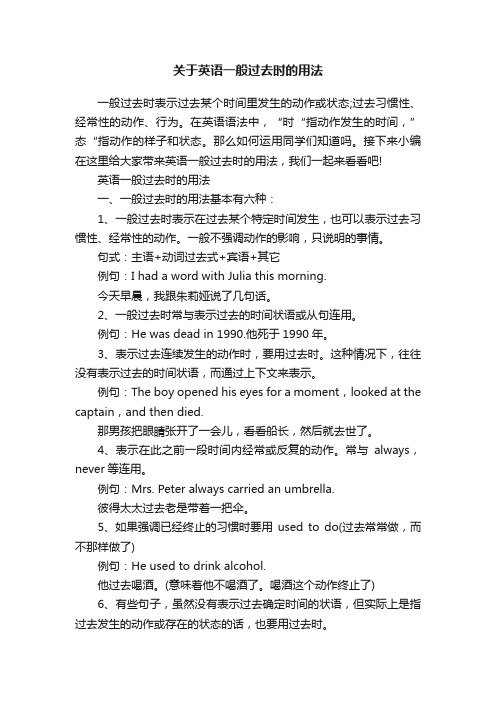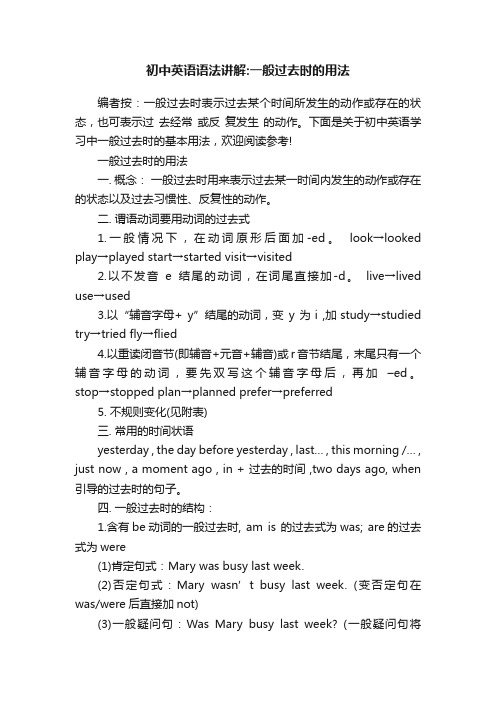一般过去时的用法
一般过去时地用法及结构

一般过去时的用法及结构1.一般过去时的基本用法一般过去时表示过去某个时间发生的动作或存在的状态,也可表示过去经常或反复发生的动作。
常和表示过去的时间状语连用,如yesterday, last week, last night, in 2003, two days ago等。
【举例】 I got up at 6:30 yesterday. 我昨天6:30起床。
My father was very busy last week. 我父亲上周很忙。
2.一般过去时的基本结构⑴肯定句“主语+动词过去式+其他”或者“主语+was/were+其他”。
【举例】 I played tennis last weekend. 我上周末打网球了。
My school trip was great. 我的学校郊游棒极了。
⑵否定句“主语+didn’t+动词原形+其他”或“主语+wasn’t/weren’t+其他”。
【举例】 The girl didn’t play computer games yesterday afternoon.这个女孩昨天下午没玩电子游戏。
Old Henry wasn’t happy last Friday. 上星期五老亨利不高兴。
⑶一般疑问句“Did+主语+动词原形+其他?”肯定回答为“Yes,主语+did”,否定回答为“No,主语+didn’t”或者“Was/Were+主语+其他?”肯定回答为“Yes,主语+was/were”,否定回答为“No,主语+wasn’t/weren’t”。
【举例】— Did you go to the beach? 你们去海滩了吗?— Yes, we did./No, we didn’t. 是的,我们去了。
/不,我们没有。
— Was your weekend OK? 你的周末过得还行吧?— Yes, it was./No, it wasn’t. 是的,还行。
/不,不行。
一般过去时 用法

一般过去时用法一般过去时(Simple Past Tense)用于描述已经发生或完成的行为、事件或状态。
下面是一般过去时的用法:1. 表示过去的某个时间点或时间段发生的动作或事件:- I watched a movie last night.(昨晚我看了一部电影。
)- They lived in London for five years.(他们在伦敦住了五年。
)2. 表示过去的习惯、经常性动作或行为:- He always played soccer on Sundays.(他过去总是在星期日踢足球。
)- We frequently went camping during the summer.(我们过去经常在夏季去露营。
)3. 表示过去的事实、真相或普遍性的陈述:- She graduated from university in 2010.(她于2010年从大学毕业。
)- Cats have nine lives.(猫有九条命。
)4. 使用否定形式(did not/didn't + 动词原形)来表达否定或拒绝的意思:- They didn't go to the party.(他们没有去参加派对。
)- I did not eat sushi.(我没有吃寿司。
)5. 使用疑问词(did + 主语 + 动词原形)来询问过去的情况、动作或事件:- Did you see the movie?(你看过那部电影吗?)- Did he go to the concert with you?(他和你一起去听音乐会了吗?)需要注意的是,一般过去时的动词变化规则为动词原形后加上-ed或-d,但也有一些特殊动词的变化形式需要记忆(如go变为went)。
一般过去时的用法

一般过去时的用法一般过去时表示过去某个时间发生的动作或存在的状态。
常和表示过去的时间状语连用。
如:last year, yesterday等;也可表示过去经常反复发生的动作,常和often, always等频率副词连用。
例如:I saw him in the street yesterday. 昨天我在街上看见他了。
Li Mei always went to school on foot last year. 去年李梅总是步行上学。
注意:也可以用“used to +动词原形”表示过去经常或反复的动作。
eg. We used to get up early. 我以前总是早起。
(意指现在不早起了)1.一般过去时的形式:动词be: 第一人称单数和第三人称单数用was, 其余的人称一律用were。
动词have: 一律用had, 没有人称和数的变化。
行为动词:一律用过去式,没有人称和数的变化,行为动词的过去式有两类,一类是规则动词,另一类是不规则动词。
一般过去时动词的肯定、否定、一般疑问句和简略回答以及特殊疑问句的形式见列表:肯定、否定形式行为动词的过去时的否定式,要使用助动词do 的过去式did,后面的谓语动词要还原为原形。
注意:在非正式语如口语中,was not, were not, had not和did not 可以分别缩写成wasn’t, weren’t, hadn’t和didn’t。
2.一般过去时的几种句型(这里只讲行为动词)肯定句结构为:主语+动词的过去式+其他。
如:He went to the toy store yesterday. 他昨天去玩具店了。
否定句结构为:主语+did not (didn’t)+动词原形+其他。
如:He didn’t go to the toy store yesterday. 他昨天没去玩具店。
一般疑问句的构成:Did+主语+动词原形+其他?如:1) -Did you go to Beijing last week?-Yes, we did. (No, we didn't.)2) -Did you meet the businessman before?-No, I didn't. (Yes, I did.)特殊疑问句的构成:疑问词+did+主语+动词原形+其他?如:1) -What did you do last night?-I did my homework.2) -Where did you go last week?-I went to Shanghai with my parents.Ⅱ. 行为动词的一般过去式变化规则行为动词的过去式有规则变化和不规则变化两种。
一般过去时四种用法

一般过去时四种用法①表示在过去某个时间发生的动作或情况。
例如:I went to school at 7:00 yesterday morning.我昨天早晨七点去上学。
②表示在过去某个时间存在的状态。
例如:She was not at home last night.她昨晚八点没在家。
③表示在过去经常或反复发生的动作,常和often(经常)、always(总是)、sometimes(有时)等表示频率的时间状语连用。
例如:He often had lunch at school last month.他上个月经常在学校吃午饭。
④表示已故的人所做的事情或情况。
例如:Ba Jin wrote a lot of novels for us.巴金写了很多部小说。
四种时间状语①yesterday 及相关短语。
例yesterdaymorning/afternoon/ev ening 昨天上午/下午/晚上。
②“last+ 时间状语”构成的短语。
例如:lastnight/month/spring/year 昨晚/上个月/去年春天/去年。
③“一段时间+ago”组成的短语。
例如:three days ago 三天以前four years ago四年以前。
④“介词+ 时间名词”组成的短语。
例如:in 1999 在1999年;on the morning of December 25th 在12月25号早上。
四种谓语动词的表现形式①be动词的过去式was、were.例如:She was a teacher five years ago. 她五年前是一名教师。
②行为动词的过去式,分为规则动词和不规则动词两种。
规则动词的过去式的构成遵循以下四个规则:1)直接在动词后加ed,例如:help-helped; want-wanted等;2)以不发音的字母e结尾时,去掉e加ed (即直接加d) , 例如:like-liked; use-used等;3)以辅音字母y结尾时,把y变成i再加ed, 例如:carry-carried; study-studied等;4)以重读闭音节结尾,双写最后一个辅音字母再加ed, 例如:stop-stopped; shop-shopped等。
一般过去时的用法

1. 表示过去某个特定时间发生的动作或存在的状态这种情况下常与“just now刚才,yesterday昨天,last year去年,in 1999在1999年,two days ago两天之前”等表示过去的时间状语连用。
She suddenly fell ill yesterday.她昨天突然病倒了。
We didn't have classes last week.上周我们没有上课。
一般过去时亦可与“today今天,this week这周,this month这个月,thisyear今年”等表示现阶段时间状语连用。
如:Did you meet him today?今天你看见他了吗?2. 表示过去的习惯性或经常发生的动作一般过去时表示过去经常或反复发生的动作,常和“often经常,always总是,once a week一周一次”等表示频度的时间状语连用。
I went to the cinema once a week when I was at school.我上学时每周去看一场电影。
When I was in the countryside, I often walked by the riverside.我在乡下时经常在河边散步。
表示过去一段时间内经常或反复发生的动作,也可以用would+动词原形或用used to加动词原形:When he was young, he would go skating every winter.他年轻时每年冬天都要去滑冰。
Mrs Smith used to have a big house in down town.史密斯夫人在城里曾经有一座大房子。
3. 在条件、时间状语从句中代替一般过去将来时They said they would let me know as soon as they got there.他们说只要他们一到达那儿就会马上让我知道的。
一般过去时的用法

一般过去时的用法一般过去时表示过去某个时间发生的动作或存在的状态,也表示过去经常或反复发生的动作。
谓语动词要用动词的过去式,常和表示过去的时间状语连用,如:yesterday昨天,last night昨晚,last week上周,last year去年等。
一.一般过去时的结构(可分两类不同的结构)1.Be 动词的一般过去时在没有实义动词的句子中使用be动词,am/is的过去式为 was ; are 的过去式were。
肯定句式:主语+be (was/were) +其他.否定句式:主语 +be (was/were) +not +其他.一般疑问句:Be (was/ were) + 主语 +其他。
2.实义动词的一般过去时态肯定句要使用动词的过去式,否定句和疑问句要使用助动词do/does 的过去式did.肯定句式:主语+动词(过去式)+其他。
否定句式:主语+ didn’t +动词(原形) +其他( did not= didn’t)一般疑问句:Did +主语+动词(原形)+ 其他(do, does 的过去式均为did)?注:1.did 和didn’t 是构成一般过去时的助动词,其特点是要在其后跟动词的原形。
2.实义动词do的一般过去时,例:Jim went home yesterday.----Jim didn’t go home yesterday.(否定句)----Did Jim go home yesterday?(一般疑问句)----What did Jim do yesterday?(特殊疑问句)二.一般过去时的判断标志词:yesterday,the day before yesterday,last+时间,this morning,时间+ago,just now,a moment ago,in+过去的时间注意:一般过去时表示过去经常或反复发生的动作,常和often经常,always ,总是,once a week一周一次,等表示频度的时间状语连用动词过去式变化规则:1.一般在动词末尾加ed,如:pull--pulled, cook--cooked, play--played2.结尾是e加d,如: taste--tasted, live--lived, use--used3.末尾是辅音字母加一个元音字母的重读闭音节,应双写末尾的辅音字母,再加ed,如:stop--stopped, plan--planned4.以“辅音字母+y”结尾的,变y为i,再加ed,如:study--studied5.不规则动词过去式:(见课后)过去时练习一.选择()1.What___________they____________dinner yesterday?A.do; have forB.did; had for;C. LeavedD.was leaving( )2.Could you tell me whattime_____________the plane?A.leftB.leavesC.leavedD.left( )3.One of us ____________band last month.A. leavesB. leaveC.leavedD. left( )4.Where ____________ your mother born?A.areB. wasC.wereD.is( )5.Do you know why he___________for classlast year?A.was always lateB.always waslateC.is late alwaysD.is alwayslate( )6.I got up____________this morning. So I_________ breakfast and went to school.te, didn’t haveB. Early,didn’t havete, hadn’tD.early,hadn’t( )7.It___________ much cold today than it___________ yesterday.A.is, isB.was, wasC.is, wasD.was, is( )8.He didn’t come__________ goodbye tous and ________ away.A.say,goB.say, wentC.to say,went D.to say, go( )9.Her pen was broken.She ________to________ a new one.A.wants, buysB.wanted, boughtC.wants,boughtD.wanted; buy( )10.I thought the dress _________ reallypretty.A.isB. wasC./D.were( )11.I____________tired now, butit__________ an exciting day.A.am, wasB.was,wasC.was,isD.am,is( )12.He said he_________ go to cook dinnerfor us.A.willB.wouldC./D.doesn’t( )13.I stayed in the sitting room and_________ my friends all the time.A.talk toB.talkedC.talkabout D.talked to( )14.She also______her______in a 1990sstyle.A.weared;hairB.wore;hairC.wear;hairD.wears;hairs( )15.I went to see you lastSaturday,________there______nobody in the room.A.but;wasB.and;wereC.and;wasD.but;is二、用所给词的适当形式填空1.He put the books away and__________(go)home.2.The boy is running and__________(tie)his shoeson the playground.3.My father__________(buy) a new computerfor__________(I)yesterday.4.He often__________(go)to school by bike,butlast year he often____(walk)to school.5.After she finished __________(pack)everything,she__________(go)to school.6.----Who______(wash)the plates on the table?----Jenny did.7.----When______you____(see)the film “Titanic”?8.It’s half past eleven now.Jim____(have)lunch.He usually____(have)itat this time.9.She________(write)to Jill last month.She________(write) to him next time.10.The students______(stop)talking when their teacher came up.三、句型转换1.The children had a good time in the park.否定句:____________________________________________一般疑问句:______________________________________________ _对划线部分提问:______________________________________________ _2.There were about nine hundred people at the concert.(音乐会)对划线部分提问:______________________________________________ _一般疑问句:______________________________________________ _否定句:____________________________________________3.There was only one problem.否定句:____________________________________________一般疑问句:______________________________________________ _肯定/否定回答:______________________________________________ _4.Ann did her homework yesterday evening.否定句:____________________________________________一般疑问句:______________________________________________ _对划线部分提问:______________________________________________ _st week I read an English book.否定句:____________________________________________一般疑问句:______________________________________________ _肯定/否定回答:______________________________________________ _对划线部分提问:______________________________________________ _四、写出下列动词的三单现、过去式和现在分词go__________ __________ __________ enjoy__________ __________ _________Buy_________ _________ __________ eat__________ __________ __________get_________ _________ __________ walk_________ __________ __________take_________ _________ _________dance__________ __________ __________ write_________ _________ _________run_________ __________ __________swim__________ __________ _________find_________ __________ _________ Begin_________ _________ _________eat__________________ ___________五.按要求变换句型1.Father bought me a new bike.Father bought_________ __________ _________ __________ me.2.Frank read an interesting book about history. __________ Frank ___________ an interesting book about history?3.He’s cleaning his rooms._____________ he ________________ ?4.Why not go out for a walk?___________ ___________ ___________ ____________ out for a walk?5.Thomas spent RMB 10 on this book.Thomas ___________ ___________ RMB 10 on this book.6.My family went to the beach last week.____________ ____________ ____________ family _________ last week?7.I didn’t have any friends.____________ ___________ have ____________ friends?8.I think she is Lily’s sister.______________________________________________ ________________9.Sally often does some reading in the morning. Sally __________ often __________ some reading in the morning.10.He is a tall boy.__________ __________ he ___________ __________?六.翻译下列句子1.我过了一个忙碌却又刺激的周末。
一般过去时用法及结构

一般过去时用法及结构1、一般过去时的用法及结构1.一般过去时的基本用法一般过去时表示过去某个时间发生的动作或存在的状态,也可表示过去常常或反复发生的动作。
常和表示过去的时间状语连用,如yesterday, last week, last night, in 2021, two days ago等。
【举例】I got up at 6:30 yesterday. 我昨天6:30起床。
My father was very busy last week. 我父亲上周很忙。
2.一般过去时的基本结构⑴确定句“主语+动词过去式+其他”或者“主语+was/were+其他”。
【举例2、】I played tennis last weekend. 我上周末打网球了。
My school trip was great. 我的学校郊游棒极了。
⑵否认句“主语+didn’t+动词原形+其他”或“主语+wasn’t/weren’t+其他”。
【举例】The girl didn’t play computer games yesterday afternoon . 这个女孩昨天下午没玩电子游戏。
Old Henry wasn’t happy last Friday. 上星期五老亨利不高兴。
⑶一般疑问句“Did+主语+动词原形+其他?”确定回答3、为“Yes,主语+did”,否认回答为“No,主语+didn’t”或者“Was /Were+主语+其他?”确定回答为“Yes,主语+was/were”,否认回答为“No,主语+wasn’t/weren’t”。
【举例】—Did you go to the beach? 你们去海滩了吗?—Yes, we did./No, we didn’t.是的,我们去了。
/不,我们没有。
—Was your weekend OK? 你的周末过得还行吧?—Yes, it was./No, it wasn’t.是的,还行。
一般过去式的结构,用法,含义及标志性时间状语

一般过去式的结构,用法,含义及标志性时间状语【精选】一、一般过去时的基本结构:1、肯定句“主语+动词过去式+其他”或者“主语+was/were +其他”。
【举例】 I played tennis last weekend. 我上周末打网球了。
My school trip was great. 我的学校郊游棒极了。
2、否定句“主语+didn’t+动词原形+其他”或“主语+wasn’t/weren’t+其他”。
【举例】 The girl didn’t play computer games yesterday afternoon.这个女孩昨天下午没玩电子游戏。
Old Henry wasn’t happy last Friday. 上星期五老亨利不高兴。
3、一般疑问句“Did+主语+动词原形+其他?”肯定回答为“Yes,主语+did”。
否定回答为“No,主语+didn’t”或者“Was/Were+主语+其他?”肯定回答为“Yes,主语+was/were”。
否定回答为“No,主语+wasn’t/weren’t”。
【举例】— Did you go to the beach? 你们去海滩了吗?— Yes, we did./No, we didn’t. 是的,我们去了。
/不,我们没有。
— Was your weekend OK? 你的周末过得还行吧?— Yes, it was./No, it wasn’t. 是的,还行。
/不,不行。
4、特殊疑问句:特殊疑问词+一般疑问句(顺序)?【举例】— What did Li Lei do last weekend? 李雷上周末干什么了?— He visited his grandparents. 他去看了他的祖父母。
— Where were you yesterday? 你昨天在哪儿?— I was at home. 我在家里。
二、一般过去时的基本用法:一般过去时表示过去某个时间发生的动作或存在的状态,也可表示过去经常或反复发生的动作。
一般过去时的用法

一般过去时现在--------------------过去将来一、一般过去时的基本定义:一般过去时是表示在过去某一时间发生的动作或存在的状态。
也可以表示在过去某一阶段经常、反复做的动作。
如:He walked to school.The children went to the zoo yesterday.The teacher often did some reading in the morning when he was a child.(这个老师在他是一个孩子时经常看书是再过去常常,动作,所以这个句子要用一般过去时)一般过去时的句式结构:1.主语+was/were+其他。
2.主语+动词的过去式+其他。
二.Be动词的过去时:Be动词过去时的句型如下:1.be动词过去时的肯定句:主语+ was/were +其他如:Mike was in the United States last year.比较be动词的现在式和过去式:如:I was very tired last night.You were absent from school two days ago.There were some books there. (那儿曾经有一些书。
)注意:There be句型用于一般过去时需把is /are变为它们的过去式:There was (were)…2.Be动词过去时的否定句:主语+ was/were + not +其他He was not in Canada last year.Be过去式的否定句结构,只要在was/were后面加上not就可以了。
它的缩写形式为:wasn't和weren't如:I wasn't busy yesterday.There weren’t any boys in the room.3.Be动词过去时的疑问句:(1)was/were +主语+其他(一般疑问句)--- W as it raining in Beijing yesterday?--- N o, it wasn't. It was cloudy.(2)特殊疑问词+ were/was +主语+其他(特殊疑问句)--- W here were you yesterday morning?--- I was at school.Be动词过去式一般疑问句的结构,只要把was/were提到主语前面,some变any , and变成or.回答时,Yes,…was/were.No,…wasn't/weren't.以疑问词开始的特殊疑问句,回答时,不能用Yes, No.直接回答所问的问题即可。
一般过去时的用法及结构

一般过去时的用法及结构1.一般过去时的基本用法一般过去时表示过去某个时间发生的动作或存在的状态,也可表示过去经常或反复发生的动作。
常和表示过去的时间状语连用,如yesterday, last week, last night, in 2003, two days ago 等。
【举例】 I got up at 6:30 yesterday. 我昨天6:30起床。
My father was very busy last week. 我父亲上周很忙。
2.一般过去时的基本结构⑴肯定句“主语+动词过去式+其他”或者“主语+was/were+其他”。
【举例】 I played tennis last weekend. 我上周末打网球了。
My school trip was great. 我的学校郊游棒极了。
⑵否定句“主语+didn’t+动词原形+其他”或“主语+wasn’t/weren’t+其他”。
【举例】 The girl didn’t play computer games yesterday afternoon.这个女孩昨天下午没玩电子游戏。
Old Henry wasn’t happy last Friday. 上星期五老亨利不高兴。
⑶一般疑问句“Did+主语+动词原形+其他”肯定回答为“Yes,主语+did”,否定回答为“No,主语+didn’t”或者“Was/Were+主语+其他”肯定回答为“Yes,主语+was/were”,否定回答为“No,主语+wasn’t/weren’t”。
【举例】— Did you go to the beach 你们去海滩了吗— Yes, we did./No, we didn’t. 是的,我们去了。
/不,我们没有。
— Was your weekend OK 你的周末过得还行吧— Yes, it was./No, it wasn’t. 是的,还行。
/不,不行。
⑷特殊疑问句:特殊疑问词+一般疑问句(顺序)【举例】— What did Li Lei do last weekend 李雷上周末干什么了— He visited his grandparents. 他去看了他的祖父母。
关于英语一般过去时的用法

关于英语一般过去时的用法一般过去时表示过去某个时间里发生的动作或状态;过去习惯性、经常性的动作、行为。
在英语语法中,“时“指动作发生的时间,”态“指动作的样子和状态。
那么如何运用同学们知道吗。
接下来小编在这里给大家带来英语一般过去时的用法,我们一起来看看吧!英语一般过去时的用法一、一般过去时的用法基本有六种:1、一般过去时表示在过去某个特定时间发生,也可以表示过去习惯性、经常性的动作。
一般不强调动作的影响,只说明的事情。
句式:主语+动词过去式+宾语+其它例句:I had a word with Julia this morning.今天早晨,我跟朱莉娅说了几句话。
2、一般过去时常与表示过去的时间状语或从句连用。
例句:He was dead in 1990.他死于1990年。
3、表示过去连续发生的动作时,要用过去时。
这种情况下,往往没有表示过去的时间状语,而通过上下文来表示。
例句:The boy opened his eyes for a moment,looked at the captain,and then died.那男孩把眼睛张开了一会儿,看看船长,然后就去世了。
4、表示在此之前一段时间内经常或反复的动作。
常与always,never等连用。
例句:Mrs. Peter always carried an umbrella.彼得太太过去老是带着一把伞。
5、如果强调已经终止的习惯时要用 used to do(过去常常做,而不那样做了)例句:He used to drink alcohol.他过去喝酒。
(意味着他不喝酒了。
喝酒这个动作终止了)6、有些句子,虽然没有表示过去确定时间的状语,但实际上是指过去发生的动作或存在的状态的话,也要用过去时。
I didn''t know you were in Paris.我不知道你在巴黎。
二、A say goes意思是俗话说,是一般现在时;A say went是一般过去时。
一般过去时的用法

一般过去时的用法一、概念1.表示在的过去某个时间里所发生的动作或存在的状态。
时间状语有:yesterday, last week, an hour ago, in 1982等。
如:1)I was at the zoo yesterday. 昨天我在动物园。
2)I went to bed at eleven last nigth. 昨晚我11:00睡觉。
2.表示在过去一段时间内,经常性或习惯性的动作。
1)When I was a child, I often played football in the street. 我在小的时候,我经常在街道上踢足球。
2)My father often drove to work last year. 去年,我爸爸经常开车上班。
二、句子结构1.在表示某个时间里存在的状态的句子,系动词用过式was,were构成。
如:(1)I was at home yesterday.昨天我在家。
(2)We were in the gym just now. 刚才我们在体育馆。
2.在表示过去某个时间里发生的动作,用动词的过去式构成。
如:I visited my uncle yesterday. 昨天我拜访了我的叔叔。
3.各种句式(1)一般过去时的肯定陈述句:主语+动词过去式+宾语或表语。
He worked in Shanghai ten years ago.(2)一般过去时的否定句:a.主语+didn’t +动词原形+宾语。
(did + not = didn't)He didn't do morning exercises yesterday.b.主语+wasn’t/weren’t +表语。
(was + not = wasn't were + not = weren't) He wasn't an English teacher ten years ago.(3)一般过去时的一般疑问句:a.Did +主语+动词原形+宾语?Did you study English in 1990 ?b.Was/Were+ 主语+表语?Was he a pupil five years ago ?(4)一般过去时的特殊疑问句:a.特殊疑问词+did + 主语+动词原形+宾语?Where did your parents live five years ago?What did you do last Sunday?b.特殊疑问词+were/was +表语?Who was at the zoo yesterday三、时间特征在一般过去时句子中,通常与下列表示过去的时间状语连用:yesterday, yesterday morning, yesterday afternoon, yesterday evening, the day before yesterday(前天), last night, last week, last month, last year, a moment ago(刚才), just now(刚才), two days ago, a week ago, in 1990,…四、动词过去式的构成规律(一)规则动词的过去式1.一般情况下,在动词原形后面加-ed。
一般过去时用法

一般过去时用法一般过去时是英语中最常用的过去时态之一,用于描述过去发生的动作、事件或状态。
本文将介绍一般过去时的用法、时态转换、标志词及常见注意事项。
一、一般过去时的用法一般过去时用于以下情况:1. 过去发生的具体动作或事件:- We went to the beach last summer.(我们去年夏天去了海滩。
)- He cooked dinner yesterday.(他昨天做了晚餐。
)2. 过去的习惯或经常性动作:- She always walked to school when she was young.(她小时候总是步行去学校。
)- We used to play basketball every Saturday.(我们过去每个星期六都会打篮球。
)3. 对现在具有影响的过去经历或经验:- I learned how to swim when I was a child, and now I love swimming.(我小时候学会游泳了,现在我非常喜欢游泳。
)- They lived abroad for five years and now they can speak fluent English.(他们在国外生活了五年,现在能够说一口流利的英语。
)二、时态转换1. 肯定句:一般过去时的肯定句结构为:主语 + 动词过去式(或助动词did + 动词原形)+ 其他。
- I studied Chinese for three years.(我学了三年中文。
)- She played tennis with her friends yesterday.(她昨天和朋友们打网球。
)2. 否定句:一般过去时的否定句结构为:主语 + did not (didn't) + 动词原形 +其他。
- We didn't go to the party last night.(我们昨晚没有去参加派对。
英语语法一般过去时的用法

英语语法一般过去时的用法一般过去时表示过去某个时间里发生的动作或状态;过去习惯性、经常性的动作、行为。
在英语语法中,“时“指动作发生的时间,”态“指动作的样子和状态。
下面是小编为您收集整理的英语语法一般过去时的用法,供大家参考!英语语法一般过去时的用法一般过去时1.一般过去时表示过去某个时间发生的动作或存在的状态,常和表示过去的时间状语连用。
一般过去时也表示过去经常或反复发生的动作感谢。
2.Be动词在一般过去时中的变化:⑴am和is在一般过去时中变为was(was not=wasn’t)⑵are在一般过去时中变为were(were not=weren’t)⑶带有was或were的句子,其否定、疑问的变化和is, am, are 一样,即否定句在was或were后加not,一般疑问句把was或were 调到句首。
3.句中没有be动词的一般过去时的句子否定句:di dn’t +动词原形,如:Jim didn’t go home yesterday.一般疑问句:在句首加did,句子中的动词过去式变回原形。
如:Did Jim go home yesterday?特殊疑问句:⑴疑问词+did+主语+动词原形?如:What did Jim do yesterday?⑵疑问词当主语时:疑问词+动词过去式?如:Who went to home yesterday?动词过去式变化规则:1.一般在动词末尾加-ed,如:pull-pulled, cook-cooked2.结尾是e加d,如:taste-tasted3.末尾只有一个元音字母和一个辅音字母的重读闭音节,应双写末尾的辅音字母,再加-ed,如:stop-stopped4.以“辅音字母+y”结尾的,变y为i,再加-ed,如:study-studied5.不规则动词过去式:am,is-was, are-were, do-did, see-saw, say-said, give-gave, get-got, go-went, come-came, have-had, eat-ate, take-took, run-ran, sing-sang, put-put, make-made, read-read, write-wrote, draw-drew, drink-drank, fly-flew, ride-rode, speak-spoke, sweep-swept, swim-swam, sit-sat 过去时练习写出下列动词的过去式is\am_______ fly_______ plant_______ are_______drink_______ play_______ go_______ make_______does_______ dance_______ worry________ ask_______taste_______ eat_______ draw________ put_______throw_______ kick_______ pass_______ do_______语法讲解一般过去时也叫单纯过去时。
一般过去时四种用法

一般过去时四种用法①表示在过去某个时间发生的动作或情况。
例如:I went to school at 7:00 yesterday morning.我昨天早晨七点去上学。
②表示在过去某个时间存在的状态。
例如:She was not at home last night.她昨晚八点没在家。
③表示在过去经常或反复发生的动作,常和often(经常)、always(总是)、sometimes(有时)等表示频率的时间状语连用。
例如:He often had lunch at school last month.他上个月经常在学校吃午饭。
④表示已故的人所做的事情或情况。
例如:Ba Jin wrote a lot of novels for us.巴金写了很多部小说。
四种时间状语①yesterday 及相关短语。
例yesterdaymorning/afternoon/ev ening 昨天上午/下午/晚上。
② “last+ 时间状语”构成的短语。
例如:lastnight/month/spring/year 昨晚/上个月/去年春天/去年。
③“一段时间+ago”组成的短语。
例如:three days ago 三天以前 four years ago四年以前。
④ “介词+ 时间名词”组成的短语。
例如:in 1999 在1999年;on the morning of December 25th 在12月25号早上。
四种谓语动词的表现形式①be动词的过去式was、were.例如:She was a teacher five years ago. 她五年前是一名教师。
②行为动词的过去式,分为规则动词和不规则动词两种。
规则动词的过去式的构成遵循以下四个规则:1)直接在动词后加ed,例如:help-helped; want-wanted等;2)以不发音的字母e结尾时,去掉e加ed (即直接加d) , 例如:like-liked; use-used等;3)以辅音字母y结尾时,把y变成i再加ed, 例如:carry-carried; study-studied等;4)以重读闭音节结尾,双写最后一个辅音字母再加ed, 例如:stop-stopped; shop-shopped等。
初中英语语法讲解:一般过去时的用法

初中英语语法讲解:一般过去时的用法编者按:一般过去时表示过去某个时间所发生的动作或存在的状态,也可表示过去经常或反复发生的动作。
下面是关于初中英语学习中一般过去时的基本用法,欢迎阅读参考!一般过去时的用法一. 概念:一般过去时用来表示过去某一时间内发生的动作或存在的状态以及过去习惯性、反复性的动作。
二. 谓语动词要用动词的过去式1.一般情况下,在动词原形后面加-ed。
look→looked play→played start→started visit→visited2.以不发音e结尾的动词,在词尾直接加-d。
live→lived use→used3.以“辅音字母+ y”结尾的动词,变y 为i ,加study→studied try→tried fly→flied4.以重读闭音节(即辅音+元音+辅音)或r音节结尾,末尾只有一个辅音字母的动词,要先双写这个辅音字母后,再加–ed。
stop→stopped plan→planned prefer→preferred5. 不规则变化(见附表)三. 常用的时间状语yesterday , the day before yesterday , last… , this morning /… , just now , a moment ago , in + 过去的时间 ,two days ago, when 引导的过去时的句子。
四. 一般过去时的结构:1.含有be动词的一般过去时, am is 的过去式为was; are的过去式为were(1)肯定句式:Mary was busy last week.(2)否定句式:Mary wasn’t busy last week. (变否定句在was/were后直接加not)(3)一般疑问句:Was Mary busy last week? (一般疑问句将was/were动词提至句首)Yes, she was. No, she wasn’t(4)特殊疑问句: How was Mary last week?注:在这种构成中,be动词有人称和数的变化,即要根据主语选用was / were。
一般过去时的用法

一般过去时一般过去时表示过去某个时间里发生的动作或状态;过去习惯性、经常性的动作、行为;过去主语所具备的能力和性格。
基本结构:主语+谓语(动词过去式)+句子其他成分;主语+was/were+形容词/名词/介词短语+过去时间;否定形式①was/were+not;②在行为动词前加didn't,同时还原行为动词;一般疑问句Did+主语+do+其他。
一般过去时常用的时间状语一、这一组,只要记住“昨天”,其它联想就很好记!yesterday,the day before yesterdayyesterday eveninglast nightlast+时间(last week , last month, last year)二、这一组,只要记住“刚才”,其它联想就很好记!just now=a moment ago“段时间+ago”表示“……前”比如“三天前”就是“three days ago”三、这一组,是考试常考的,需要特别记忆!this morningwhen I was five years old,in +过去时间词(in 1998)Ago(two hours ago(一段时间+ago), yesterday(句子开头或结尾), the day before yesterday, last week,last(year, night, month…), 具体时间(如Jan.fourth), just now, at the age of , one day, long ago, once upon a time(很久以前), and so on,this morning.long long ago.三、口诀一般过去时并不难,过去动作、状态记心间。
动词要用过去式,时间状语句末站。
否定句很简单,didn't 站在动原前,其它部分不要变。
一般疑问句也好变,did放在句子前,主语、动原、其它部分依次站立。
- 1、下载文档前请自行甄别文档内容的完整性,平台不提供额外的编辑、内容补充、找答案等附加服务。
- 2、"仅部分预览"的文档,不可在线预览部分如存在完整性等问题,可反馈申请退款(可完整预览的文档不适用该条件!)。
- 3、如文档侵犯您的权益,请联系客服反馈,我们会尽快为您处理(人工客服工作时间:9:00-18:30)。
般过去时的用法一般过去时表示过去某个时间发生的动作或存在的状态,也表示过去经常或反复发生的动作。
谓语动词要用动词的过去式,常和表示过去的时间状语连用,女口:yesterday 昨天,last night 昨晚,last week 上周,last year 去年等。
一.一般过去时的结构(可分两类不同的结构)1. Be 动词的一般过去时在没有实义动词的句子中使用be 动词,am/is 的过去式为was ;are 的过去式were。
肯定句式:主语+be (was/were) + 其他.否定句式:主语+be (was/were) +not + 其他. 一般疑问句:Be (was/ were) + 主语+其他。
2. 实义动词的一般过去时态肯定句要使用动词的过去式,否定句和疑问句要使用助动词do/does 的过去式did.肯定句式:主语+动词(过去式)+ 其他。
否定句式:主语+ didn 't +动词(原形)+其他(did not= didn 't)一般疑问句:Did +主语+动词(原形)+ 其他(do, does 的过去式均为did)? 注: 1.did 和didn 't 是构成一般过去时的助动词,其特点是要在其后跟动词的原形。
2. 实义动词do 的一般过去时,例:Jim went home yesterday. --- Jim didn ' t go home yesterday.(否定句)--- Did Jim go home yesterday?(一般疑问句)--- What did Jim do yesterday?(特殊疑问句)二.一般过去时的判断标志词:yesterday,the day before yesterday,last+ 时间,this morning, 时间+ago,just now,a moment ago,in+ 过去的时间注意:一般过去时表示过去经常或反复发生的动作,常和often 经常,always ,总是,once a week 一周一次,等表示频度的时间状语连用动词过去式变化规则:1. 一般在动词末尾加ed, 如:pull--pulled, cook--cooked, play--played2. 结尾是e 力口d,女口: taste--tasted, live--lived, use--used3. 末尾是辅音字母加一个元音字母的重读闭音节,应双写末尾的辅音字母,再力口ed,女口:stop-stopped, plan--planned4. 以“辅音字母+y ”结尾的,变y为i,再加ed,如:study-studied5. 不规则动词过去式:(见课后)过去时练习选择( ) 1.What __________ they ____________ dinner yesterday?D.wanted; buyA.do; have forB.did; had for;C. LeavedD.was leaving( )2.Could you tell me what time _______________ t he plane?A.leftB.leavesC.leavedD.left( )3.One of us ______________ band last month.A. leavesB. leaveC.leavedD. left( )4.Where _______________ your mother born?A.areB. wasC.wereD.is ( )5.Do you know why he _______________ for class last year?A.was always lateB.always was lateC.is late alwaysD.is always late( )6.I got up _______________ this morning. So I ________ breakfast and went to school.te, didn 't haveB. Early, didn 't havete, hadn ' tD.early, hadn 't( )7.It ______________ much cold today than it ___________ yesterday.A.is, isB.was, wasC.is, wasD.was, is ( )8.He didn ' t come __________ goodbye to us and ________ away.A.say,goB.say, wentC.to say, wentD.to say, go( )9.Her pen was broken.She ________ to _______ a new one.A.wants, buysB.wanted, boughtC.wants,bought ( )10.I thought the dress ________ really pretty.A.isB. wasC./D.were( )11.I ______________ tired now, but it __________ an exciting day.A.am, wasB.was,wasC.was,isD.am,is( )12.He said he ____________ go to cook dinner for us.A.willB.wouldC./D.doesn ' t( )13.I stayed in the sitting room and _________ my friends all the time.A.talk toB.talkedC.talk aboutD.talked to( )14.She also __________ her _____ in a 1990s style.A.weared;hairB.wore;hairC.wear;hairD.wears;hairs( )15.I went to see you last Saturday, ________ t here _____ nobody inthe room.A. but;wasB.and;wereC.and;wasD.but;is二、用所给词的适当形式填空1. He put the books away and ________ (go)home.2. The boy is running and ________ (tie)his shoes on the playground.3. My father ________ (buy) a new computer for _________ (I)yesterday.4. He often ___________ (go)to school by bike,but last year heoften ___ (walk)to school.5. After she finished _________ (pack )everything,she ______________ (go)to school.6. ----Who ____ (wash)the plates on the table?----Jenny did.7. ----When ___ you _____ (see)the film “ Titanic ” ?8. It' s half past eleven now.Jim ____ (have)lunch.He usually ____ (have)itat this time.9. She _______ (write)to Jill last month.She __________ (write) to him nexttime.10. The students _____ (stop)talking when their teacher came up.三、句型转换1. The children had a good time in the park.否定句:____________________________________________________一般疑问句:________________________________________________________对划线部分提问:________________________________________________________ 2. There were about nine hundred people at the concert.( _____ 音乐会)对划线部分提问:________________________________________________________ 一般疑问句:________________________________________________________否定句:____________________________________________________3. There was only one problem.否定句:____________________________________________________一般疑问句:________________________________________________________肯定/否定回答:_________________________________________________________ 4. A nn did her homework yesterday eve ning.否定句:____________________________________________________一般疑问句:________________________________________________________对划线部分提问:________________________________________________________ 5. Last week I read an English book.否定句:____________________________________________________一般疑问句:________________________________________________________肯定/否定回答:_________________________________________________________ 对划线部分提问:________________________________________________________2. Frank read an interesting book about history._________ Frank ___________ an in terest ing book about history?3. He' s cleaning his rooms.____________ he ________________ ?4. Why not go out for a walk?__________ _________ __________ ___________ out for a walk? 5. Thomas spent RMB 10 on this book.Thomas __________ __________ RMB 10 on this book.6. My family went to the beach last week.___________ ___________ ___________ family ________ last week?7.I didn ' t have any friends.___________ __________ have ___________ friends?8.I think she is Lily 's sister.9. Sally often does some reading in the morning.Sally _________ often _________ some reading in the morning.10.He is a tall boy._________ _________ he __________ __________ ?六.翻译下列句子1.我过了一个忙碌却又刺激的周末。
